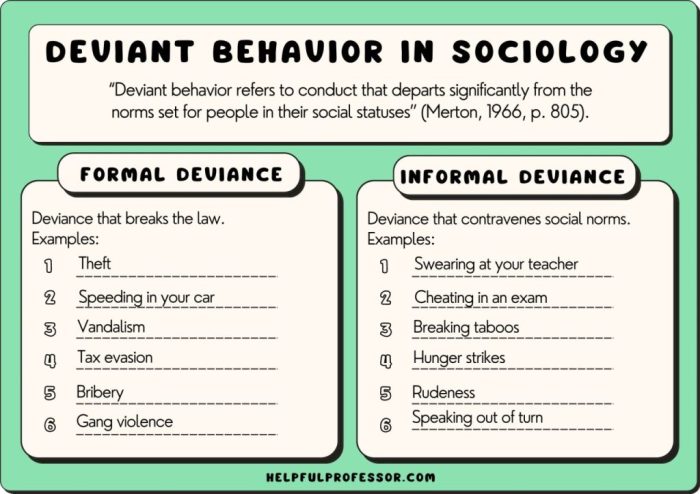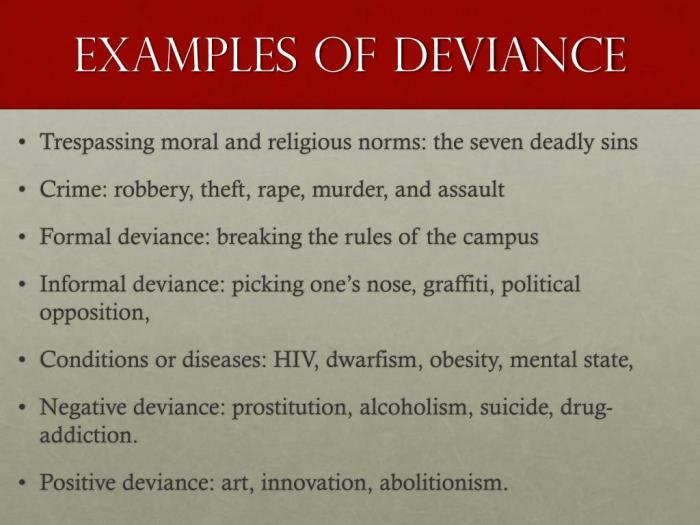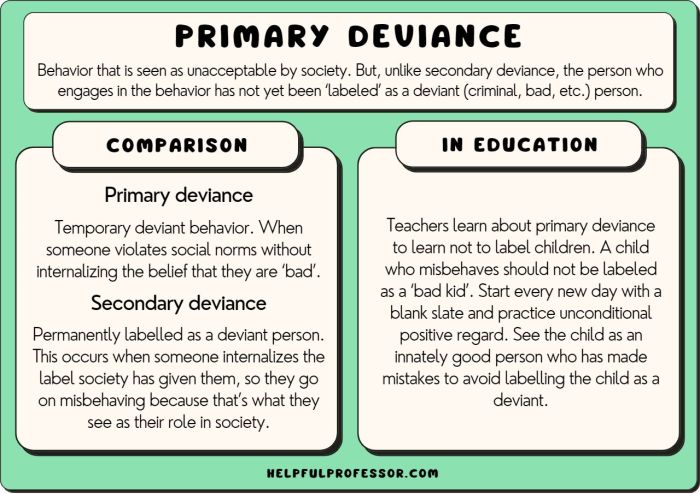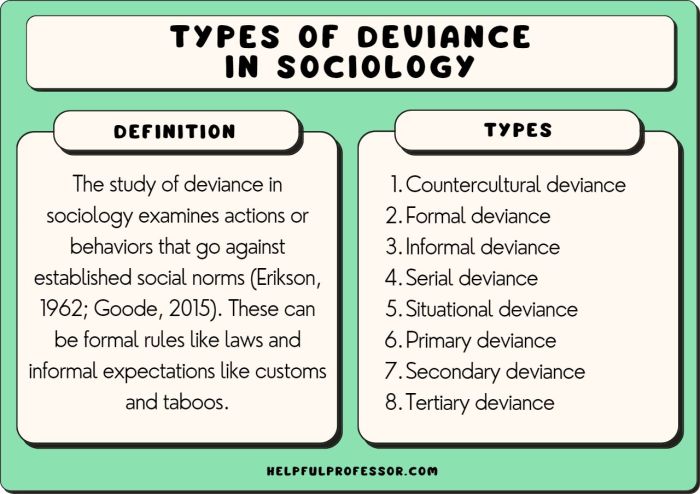All deviant behavior is a violation of the criminal law. This principle forms the cornerstone of modern criminal justice systems, shaping the boundaries between acceptable and unacceptable conduct. This essay delves into the intricate relationship between deviant behavior and criminal law, exploring the complexities and exceptions that challenge this fundamental premise.
The concept of deviant behavior encompasses actions that deviate from societal norms and expectations. Various theories attempt to define and explain these deviations, including sociological, psychological, and biological perspectives. Criminal law, on the other hand, establishes a set of rules and punishments designed to protect society from harmful conduct.
Definition of Deviant Behavior

Deviant behavior refers to actions or behaviors that deviate from societal norms and expectations. It encompasses a wide range of conduct, from minor violations of social conventions to serious crimes. Key characteristics of deviant behavior include its departure from established social rules, the negative reactions it evokes from others, and its potential to disrupt social order.
Various theories and perspectives have been proposed to define deviant behavior. The sociological perspective focuses on the social context in which deviant behavior occurs, emphasizing the influence of social norms and values. The psychological perspective explores the individual factors that contribute to deviant behavior, such as personality traits and mental disorders.
The labeling theory suggests that deviant behavior is a result of social labeling, where individuals are labeled as deviant by others, leading to self-fulfilling prophecies.
Criminal Law and Deviant Behavior
The criminal law system is a set of laws that define crimes and impose punishments for their violation. Criminal law serves the purpose of protecting society from harmful or dangerous behaviors, maintaining social order, and deterring crime.
The relationship between deviant behavior and criminal law is complex. Not all deviant behaviors are criminalized, and not all crimes are considered deviant. The criteria used to determine whether a deviant behavior constitutes a criminal offense typically involve the severity of the harm caused, the intent of the actor, and the social consensus on the wrongfulness of the behavior.
Exceptions to the Rule
There are some exceptions to the general rule that all deviant behavior is a violation of the criminal law. Certain behaviors, although considered deviant, may not be criminalized due to various reasons.
- Social Tolerance:Some deviant behaviors, such as eccentric or unconventional behavior, may be tolerated by society and not considered serious enough to warrant criminalization.
- Cultural Differences:Behaviors that are considered deviant in one culture may be acceptable or even encouraged in another. Cultural differences can influence the definition and criminalization of deviant behaviors.
- Harm Principle:The harm principle states that an action should not be criminalized unless it causes harm to others. Behaviors that do not cause significant harm to others may not be criminalized, even if they are considered deviant.
Societal and Cultural Influences
Societal norms and values play a significant role in shaping the definition of deviant behavior. What is considered deviant in one society may be considered acceptable in another. Cultural differences can influence the perception, interpretation, and criminalization of deviant behaviors.
Social control mechanisms, such as laws, sanctions, and social norms, are used to enforce societal expectations and prevent deviant behavior. The strength and effectiveness of these mechanisms vary across societies, impacting the prevalence and consequences of deviant behavior.
Ethical and Policy Considerations
The criminalization of deviant behavior raises ethical and policy concerns. Overcriminalization, the excessive use of criminal laws to address social problems, can have unintended consequences such as the erosion of individual rights, the stigmatization of certain groups, and the overburdening of the criminal justice system.
Policymakers face the challenge of balancing the need for social order and the protection of individual freedoms. They must carefully consider the potential benefits and drawbacks of criminalizing deviant behaviors, ensuring that laws are proportionate, fair, and respect fundamental rights.
Comparative Perspectives, All deviant behavior is a violation of the criminal law.
The legal treatment of deviant behavior varies across countries and jurisdictions. Factors such as cultural norms, political ideologies, and historical contexts influence the criminalization of deviant behaviors.
Comparative studies of different legal systems can provide insights into the variations in criminalization policies. They can highlight the different approaches taken to address social problems, the effectiveness of different strategies, and the implications for individuals and societies.
Questions and Answers: All Deviant Behavior Is A Violation Of The Criminal Law.
What is the rationale behind criminalizing deviant behavior?
Criminalizing deviant behavior serves to protect society from harmful or disruptive conduct that violates fundamental societal values and norms.
Are all deviant behaviors criminalized?
No, not all deviant behaviors are criminalized. Only those that pose a significant threat to societal order, such as violence, theft, or fraud, are typically criminalized.
How do societal norms influence the definition of deviant behavior?
Societal norms play a crucial role in shaping the definition of deviant behavior. Actions that violate widely accepted norms, such as public nudity or substance abuse, are more likely to be considered deviant.


